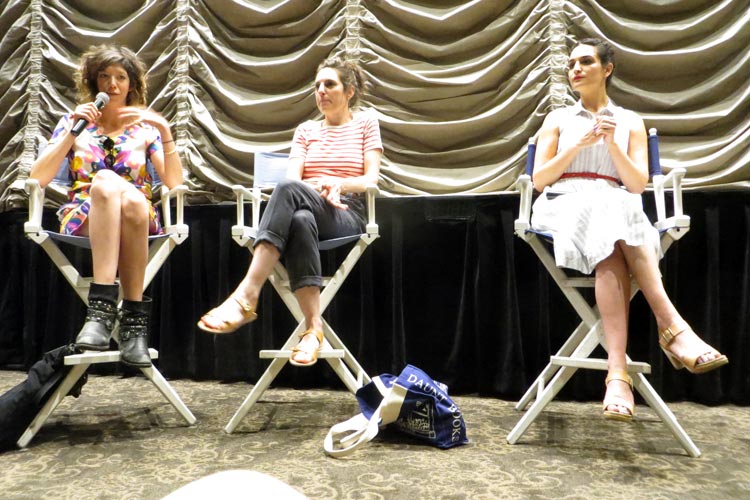The following questions and answers are excerpted from a conversation that followed the NBR screening of Obvious Child.
What motivated you to expand the short?
Gillian Robespierre: It first started before the short was even finished, in the editing room. We had a rough cut of thirty minutes, the short ended up being twenty. Sitting in that room watching Jenny’s performance was really moving and exceptional, and I knew that we were sitting on something that could be told in a bigger way… and a performance that was so pitch-perfect to the tone and story we wanted to tell. But we didn’t have the money or time, and I’m glad, because we all had to grow up as artists and creators. We just let it loose as a short, and it did really well—a lot of publications wrote about it, and it started a conversation that was really encouraging me to actually go out and turn this into something bigger.
“I think the movie has a lot of examples of thoughtful connections, and about how sometimes it’s really hard to make those.”
How did you create the standup material we see in the film?
Jenny Slate: Gillian wrote the standup in the film based in the style she had seen me perform in. I actually improvised a standup set based off what she had written, so that we could see where the natural rhythms were and which moments seemed too “scripted,” which we didn’t want. Personally, as a standup, I just kept thinking, “I can’t let this be bad,” because I really don’t like when something seems inauthentic. I hate that. So we did that, and Gillian recorded that improvised set (which included a lot of her original script), and then went and rewrote. And on the day of the shoot, we had a beat-sheet, and we went through it. On stage, it was a lot of what she had written, and a lot of new things came up: I think there are three of my own standup jokes that got included in the end, that I threw in during the process to make sure that the didn’t differ in tone from the rest of the material.
It’s interesting that even though it’s completely her choice, she also decides at the end of the day to give him a say in it and let him know.
Slate: I think the movie has a lot of examples of thoughtful connections, and about how sometimes it’s really hard to make those. It’s really hard for Donna to talk to her mom about this. Also, I like that even though Donna makes a clear choice, in no way is the movie instructional on how to deal with an unplanned pregnancy, or more generally, how to deal with your late ‘20’s or being human. There are a lot of ‘trips’ that don’t make her completely fall on the ground. And she kind of turns that into a style of walking.
Can you talk about deciding to work on making this story into a feature, and coming onboard?
Elisabeth Holm: Gillian and I met three years ago at IFP, and we just really dug each other. We’re both born and raised New Yorkers, and we really bonded. She told me she was trying to develop a feature version of her 2009 short, and I thought the short was so charming and funny. And I just really wanted everyone in the world to know this story and see the work of these two women, and to make it bigger and more badass, and to be a part of bringing that to life. We worked together for about a year and a half really figuring out the script, figuring out the story, figuring out the evolution of Donna’s character… turning her into a standup comedian, writing even more for Jenny, and trying to figure out dialog that sounds like the way we all actually speak! We especially worked to make sure that the conflict would never be, “will she or won’t she have the abortion,” but instead moving it into, “will she or won’t she learn how to let someone in, and be vulnerable, be honest with herself and with him?”

